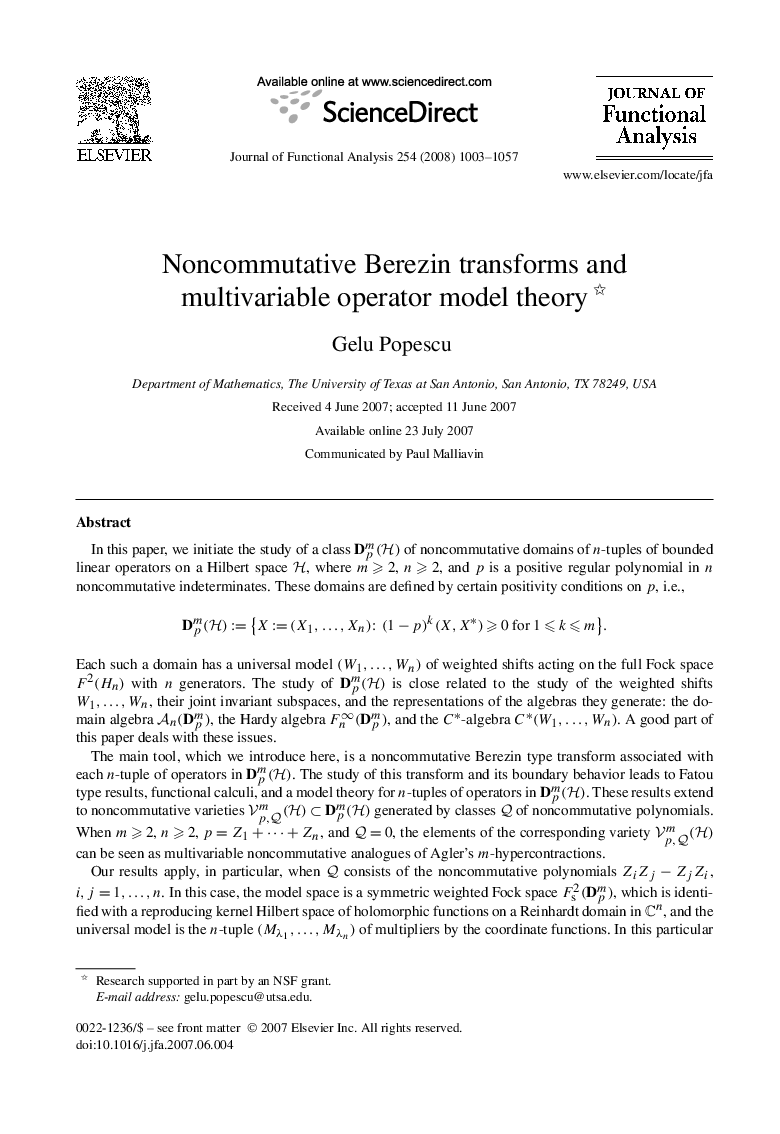| Article ID | Journal | Published Year | Pages | File Type |
|---|---|---|---|---|
| 4592729 | Journal of Functional Analysis | 2008 | 55 Pages |
In this paper, we initiate the study of a class Dpm(H) of noncommutative domains of n -tuples of bounded linear operators on a Hilbert space HH, where m⩾2m⩾2, n⩾2n⩾2, and p is a positive regular polynomial in n noncommutative indeterminates. These domains are defined by certain positivity conditions on p, i.e.,Dpm(H):={X:=(X1,…,Xn):(1−p)k(X,X∗)⩾0 for 1⩽k⩽m}. Each such a domain has a universal model (W1,…,Wn)(W1,…,Wn) of weighted shifts acting on the full Fock space F2(Hn)F2(Hn) with n generators. The study of Dpm(H) is close related to the study of the weighted shifts W1,…,WnW1,…,Wn, their joint invariant subspaces, and the representations of the algebras they generate: the domain algebra An(Dpm), the Hardy algebra Fn∞(Dpm), and the C∗C∗-algebra C∗(W1,…,Wn)C∗(W1,…,Wn). A good part of this paper deals with these issues.The main tool, which we introduce here, is a noncommutative Berezin type transform associated with each n -tuple of operators in Dpm(H). The study of this transform and its boundary behavior leads to Fatou type results, functional calculi, and a model theory for n -tuples of operators in Dpm(H). These results extend to noncommutative varieties Vp,Qm(H)⊂Dpm(H) generated by classes QQ of noncommutative polynomials. When m⩾2m⩾2, n⩾2n⩾2, p=Z1+⋯+Znp=Z1+⋯+Zn, and Q=0Q=0, the elements of the corresponding variety Vp,Qm(H) can be seen as multivariable noncommutative analogues of Agler's m-hypercontractions.Our results apply, in particular, when QQ consists of the noncommutative polynomials ZiZj−ZjZiZiZj−ZjZi, i,j=1,…,ni,j=1,…,n. In this case, the model space is a symmetric weighted Fock space Fs2(Dpm), which is identified with a reproducing kernel Hilbert space of holomorphic functions on a Reinhardt domain in CnCn, and the universal model is the n -tuple (Mλ1,…,Mλn)(Mλ1,…,Mλn) of multipliers by the coordinate functions. In this particular case, we obtain a model theory for commuting n -tuples of operators in Dpm(H), recovering several results already existent in the literature.
